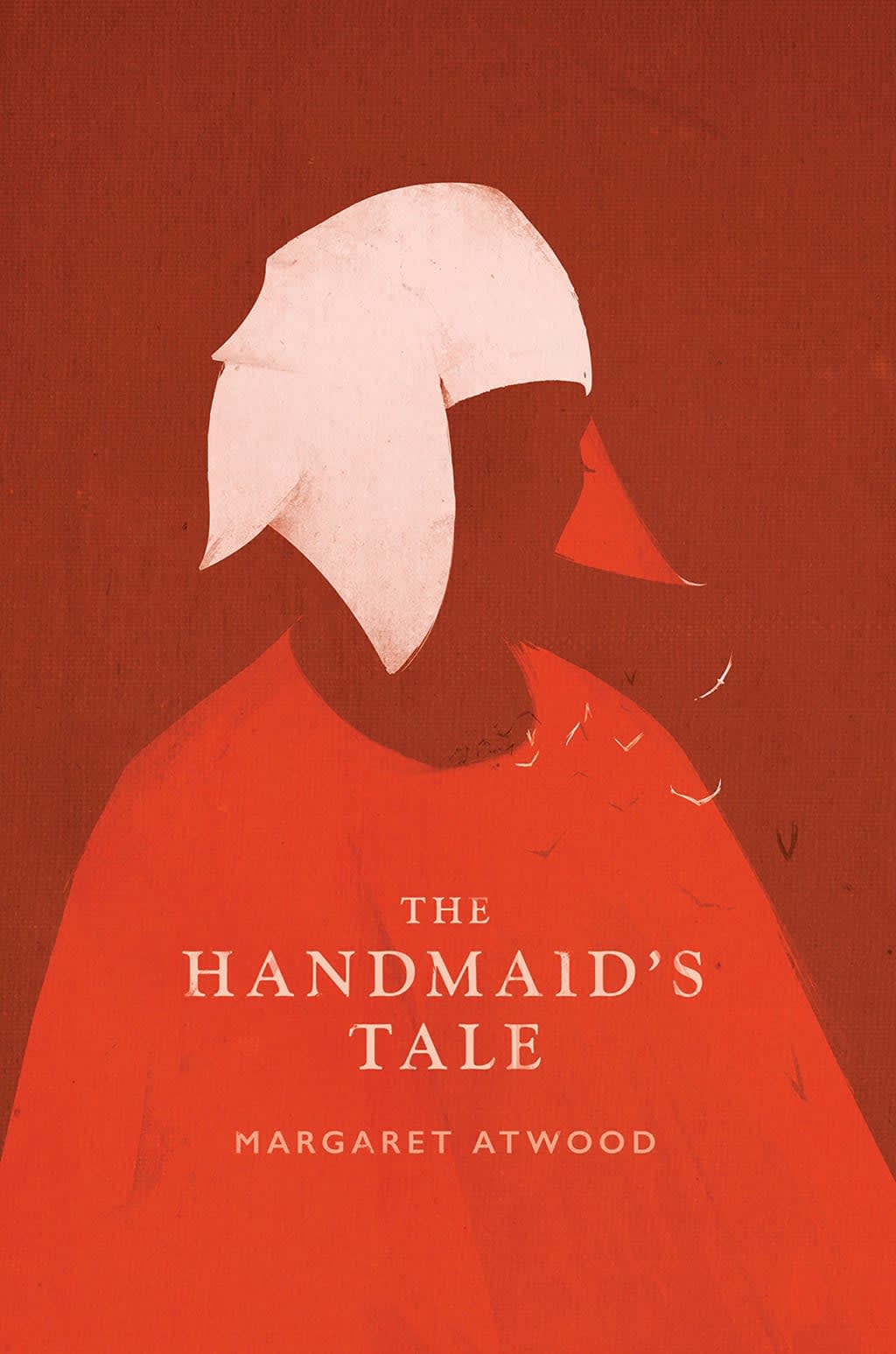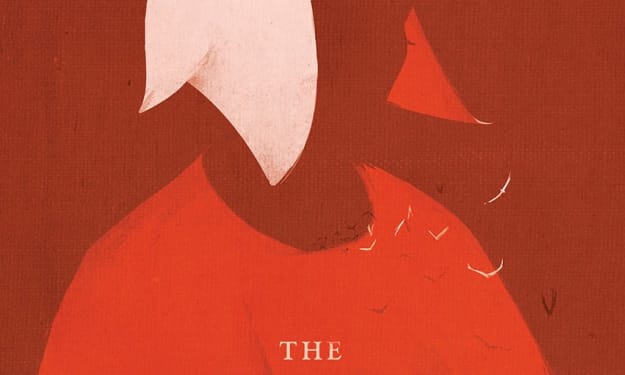
CHAPTER 20
Offred and the Handmaids file into the house where Ofwarren is to give birth. Offred notices the large amount of food placed out for the celebration. It should be noted that in the sequel, The Testaments, food wastage is considered heinous because of the ongoing war slowing supply lines. This extravagance of food denotes the Wife's and Commander's status, especially the coffee and wine. Handmaids are not permitted caffeine or alcohol and have strict diets because of their role as breeding slaves. The inclusion of wine is also interesting because many modern day evangelical beliefs claim alcohol and drunkenness to be sinful. This is a symbol of privilege, a brief glance into the moral hypocrisy of the elite families that supposedly represent the utmost godliness.
While the Handmaid's are helping Ofwarren give birth, the Wives are having a ridiculous parody of the ritual, the household's Wife pretending to be in labor while the other Wives comfort her. The pregnant Handmaid is to be thought of as an extension of the Wife's body. Whereas all the women are overseeing the birth, the Commanders are not present. Offred notes that the Commander of the household is probably awaiting his promotion. In Gilead, Commanders are given promotions based on the children they provide to the regime. The absence of the Commanders is also a social commentary of how men in domineering patriarchal marriages in the real world see the birth and caring for children as a wife's role rather than an egalitarian effort.
Ofwarren is giving birth in the Commander's and Wife's bedroom, notably the same bed where they performed the rape ritual to get Ofwarren pregnant. This is also an expression of Gilead's doctrine, their striving to re-establish traditional values. They reject modern medicine, going back to the days of mothers giving birth in their beds with only midwives attending, and only a doctor if necessary. The Handmaids are not permitted epidurals or any form of pain relief, because Gilead believes that a woman's suffering is necessary to bring forth life.
Offred muses that she almost likes Janine as she relates to her suffering. "After all, she's one of us; what did she ever want but to lead her life as agreeably as possible?" This form of sisterhood is similar among Handmaids because they are suffering in solidarity with the evils of Gilead. The Aunts and other Handmaids are attending to Janine as she endures the contractions. Offred notes that there are twenty-five to thirty Handmaids, which makes one wonder just how big one district of Gilead is. Possibly, this is an area only consisting of the elite families, the most affluent Commanders who have proven themselves in war and in virility. Offred notes that not all Commanders have Handmaids, and that some Wives are still fruitful.
Offred recalls her days from the Red Center, where they were taught lessons from the Bible, or at least, what the Aunts claimed was from the Bible. Indeed, the line "From each, according to her ability; to each, according to his needs" is a bastardized Karl Marx quote, not from St. Paul as the Aunts say. Offred remembers lessons from Aunt Lydia stating that they are a transitional generation. Usually, the term "transition generation" is used to describe people born in the 1990s. Our parents grew up in families where their fathers were the bread-winner, mothers were the homemakers, boys went to war, and girls got married young and had families of their own. We are considered transitional because, most likely, our generation grew up with parents who both worked, divided the house chores among themselves, and boys and girls went to school and then to college instead of war. In Gilead, the Handmaids are not actually the transitional generation - they are the progenitors of the stolen children who will be the generation. Handmaids are considered as commodities, means to an end, vessels to be used until they can't anymore. They likely won't be mentioned in any Gilead Household again after the children are born and forcefully surrendered.
Aunt Lydia's further explanation of Handmaids is also telling, "For the ones who come after you, it will be easier. They will accept their duties with willing hearts."
Offred offers her own understanding of the situation, "Because they will have no memories, of any other way."
Aunt Lydia actually says, "Because they won't want things they can't have."
Anybody versed in certain revolutions that happened as a result of people "wanting what they couldn't have" can see the flaw in this logic. For instance, the Romanian Revolution of 1989 was the culmination of a two-decades long snowballing catastrophe sparked by economic turmoil and humans rights violations including the heinous Decree 770 enacted by Nicolae Ceaușescu which outlawed contraception and abortions. Notably, the revolution was most likely perpetrated by the very children the Ceaușescu Regime forced into the world.
Offred recalls attending classes at the Red Center. The women who are forced to go through the Red Center are grown adults, yet the practices of the Aunts treat them like children in daycare. Communal lunches, afternoon naps, and Aunt infantilization of the Handmaids like unruly children are no doubt meant to break their spirit. Offred remembers high school documentaries of third-world countries still using primitive technology to do basic, back-breaking labor that modern technology in affluent countries had simplified years ago.
In contrast to these documentaries, Aunt Lydia showed hardcore pornography. You'd think that an extremist Christian nation would be against the teachings and showings of such things, but they did it to project that these were the common perceptions of women before the Gilead takeover. They taught this in order to show that Gilead shows a far better respectability toward women than who they consider godless heathens, but really, both perceptions are bad. Yes, Gilead might not be subjecting the women to such torturous lengths as cutting them open, but they were still treating women as objects rather than people. Gilead believes that a woman has to have value to exist within their hierarchy and that means that they must either be fruitful, be submissive, and/or be respectful. Even the highest status of Wife is afforded little value in comparison to her Commander husband or potential sons. Boys and men have more value to the regime than girls do.
Offred sees her mother in one of the videos Aunt Lydia claims to be an "Unwoman documentary". An Unwoman is any woman that Gilead insists is undesirable or undeserving of the name "woman". These include (but are not limited to): feminists, college-educated women, infertile lesbians, sex workers, doctors, adherents to other than Gilead religion, and (at least in the novel) women of color. Offred's mother was a radical second-wave feminist and we switch to Offred's mother's monologue, which is likely a projection of Offred's memories. She had a baby despite her and her friends being against any notion that a woman's role was to have children. She recalls several fallings-out with her friends because they kept informing her of the risks of having children after 35 and how hard it was being a single parent...which ironically, seems like things a Gilead-supporter would do. Offred's mother is very headstrong and loves to defy expectations. She's also rather outspoken and sometimes intrusive, ranting at length about her beliefs and the state of feminism. She doesn't like men, stating that they're a "woman's strategy for making other women", which arguably is just as bad as a man claiming women existed to make them sons.
The similarities between Offred's mother's militant feminism and Gilead's anti-feminist rhetoric were implemented on purpose to implement the 1980's real-world alliance between the militant feminists' and the Religious Right's war against pornography and prostitution. Earlier in the novel, Offred recalls an instance of her mother's friends burning pornographic magazines, similar to how Gilead burned books and other media they deemed sinful. It's unsettlingly common for opposing political parties to come together to fight against one issue, then for the totalitarian party to annihilate the other when they are of no further use. This happens because of populism in which political leaders use specific political issues to gain traction, like issues of climate change, inflation, and, in Gilead's case, falling birth rates.
Offred remembers Luke teasing her with stereotypical sexist things and how her mother would playfully and drunkenly rebuke him. She starts into a spiel about how young people don't appreciate things, but it's not the conservative baby-boomer points we're all familiar with. It's how feminists have paved the way for them just to live normal lives. She notes how Luke wouldn't be able to do "feminine" activities like cook or he'd be perceived as gay. Offred notably calls her mother "Mother", as a grown child with resentment might call their mother. Her mother would express how lonely it was for her to be a part of such a movement, even though she had friends. Quite possibly, she couldn't be seen in public due to motions to try to stop the feminist movements was happening. Or maybe she sought a relationship like a romantic partner but it went against her ideals.
Offred lists her grievances against her mother, how she didn't want to vindicate her life for her. She remembers yelling, "I am not your justification for existence!" which is a phrase that definitely comes back to bite her. Even though she feels this way, she expresses melancholy and misses her mother, wanting hopelessly for things to be back to normal.
CHAPTER 21
Offred notes the smell of the room, of flesh, blood, and tears. She compares it to places where animals give birth, where life begins. She mentions the word "matrix". The dictionary definition of matrix is "an environment or material in which something develops; a surrounding medium or structure." In a way, the Handmaids are all matrices for not just the potential for life but the potential for change.
The Handmaids are all a part of the birthing ritual, chanting instructions to help Janine get through her labor. Offred notes that the soft chanting "envelopes her like a membrane" and it's very apt because the process of birthing seems to include all of the Handmaids in sync, like parts of a cell. Offred manages to consult a fellow Handmaid and ask about Moira and the Handmaid actually offers her real name, which is risky considering they aren't supposed to be using their real names now. Nevertheless, Offred considers telling her her name, but Aunt Elizabeth is aware of their missing voices in the chant.
The Handmaids all experience sympathy pains, aches in their breasts, backs, and stomachs, all areas associated with labor pains. Janine beings to go into transition and has to go to the toilet. Offred muses over how its Janine's second baby and how she should know that she's going through transition. "But who can remember pain, once it's over? All that remains of it is a shadow, not in the mind, even, in the flesh. Pain marks you, but too deep to see. Out of sight, out of mind." It's worth considering that Handmaid who have had children before the Gilead takeover most likely gave birth in hospitals with pain relief.
During the ritual, a Martha shows up to hand the Handmaids grape juice, most likely Kool-Aid or some Gileadean brand powdered drink mix. Offred notes that someone has spiked it with wine and the use of grape-flavored drink mix is particularly significant within this type of setting because it brings the Jonestown Massacre to mind, where over 900 people under the direction of Jim Jones willingly and forcefully drank grape Flavor-Aid laced with cyanide. All the women of Gilead have "drunk the Kool-Aid", whether they wanted to or not.
Janine is ready to deliver the baby and Aunt Elizabeth signals to tell the Wives. The Handmaids all gather around her, feeling the imminent birth like "a bugle, a call to arms, like a wall falling." It's interesting that these terms are used to describe waiting for a birth, because Handmaids are trained to think of themselves as shock troops, the ones fighting the infertility war. This goes to show how much the Handmaids are brainwashed, even the Narrator, because for all her derision of the Aunts' teachings, she's still following their lessons.
The Commander's Wife (of Janine's household) is brought in to sit above Ofwarren on the birthing stool while the latter sits below. The Wife pretends to give birth while Janine actually gives birth, Janine serving as the surrogate womb. Janine is described as glowing "like a moon in cloud", the moon cycle being a longstanding theme of pregnancy and fertility.
The baby turns out to be a girl, which Offred laments, knowing that it's automatically doomed to a forcefully submissive lifestyle. The Handmaids, nevertheless, are happy because they're remembering their own experiences after giving birth. The Narrator remembers her husband's elation at becoming a father, so overcome with happiness that he couldn't sleep. Though, unlike the experiences of holding their own babies, Janine is immediately robbed of this experience as the baby is given to the Household's Wife. All of the Wives surround the bed where the Wife is cradling Janine's baby, Offred noticing that they all look envious. Motherhood to the Wives is now seen as a marking of status and prestige, so it's not just about the Wives wanting to desperately be mothers, it's about their craving for whatever power they can muster in this oppressive society. "The Commander's Wife looks down at the baby as if it's a bouquet of flowers; something she's won, a tribute". These children will be seen as nothing more than status symbols to some Wives, a brief glimpse into the neglectful lives these children will suffer.
The Wife names the baby Angela, for obvious reasons. The Handmaids block this scene from Janine so she doesn't have to witness the injustice of the Wife stealing her daughter. Her only involvement in the child's life will be to breastfeed her and then she'll be shipped off to another Household. The Handmaids celebrate the birth because they are so rare as it is. Offred notes that Janine's ultimate reward for giving birth to a viable baby is to never be declared Unwoman or be sent to Colonies. Considering her future fate of being delivered to another house to repeat the whole miserable rape ritual and possibly have another baby stolen, this doesn't seem like too much of a reward.
The adrenaline high from the birth wears off, their bodies still feeling the pains of sympathetic labor, but having no baby to show for it. "Each of us holds in her lap a phantom, a ghost baby. What confronts us, now the excitement's over, is our own failure." A Handmaid's ability to conceive is seen as a show of her favor with God, at how worthy and fruitful she is. To fail month after month is seen as not only a failure on part of the Handmaids but a failure of faith. This is the reason Handmaids who have not conceived in three postings are deemed Unwomen and sent to the Colonies.
At the end of the chapter, the Narrator calls on her mother, saying that there's a women's culture, though it's nothing like what she meant. The women's culture Handmaids experience is a forced comradery strengthened through coping mechanisms, solidarity in suffering, and Stockholm Syndrome. The sequel to The Handmaid's Tale, The Testaments, has an early Sons of Jacob Commander explain how they strived to divide women's and men's roles into their own spheres. The women's sphere would still be ultimately controlled by men, but high-ranking women such as Aunts would create the foundation for the Handmaid system, proper feminine education for young girls, and organizing a genealogical archive to track births of children and plan marriages. So, while it might seem like a women's culture, it is nonetheless inspired by the misogynistic, toxic mores of Gileadean men.
About the Creator
CD Turner
I write stories and articles. Sometimes they're good.






Comments
There are no comments for this story
Be the first to respond and start the conversation.